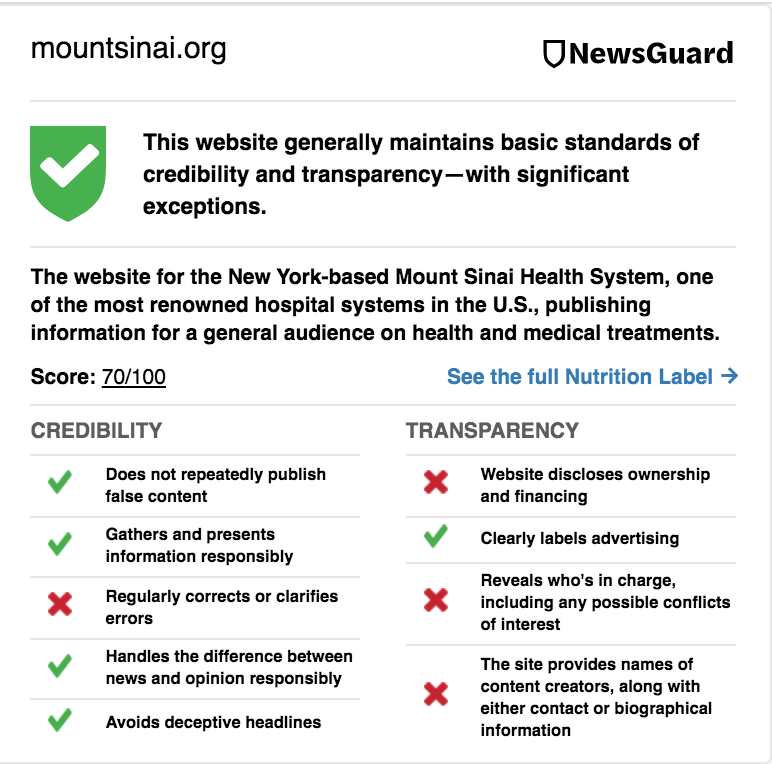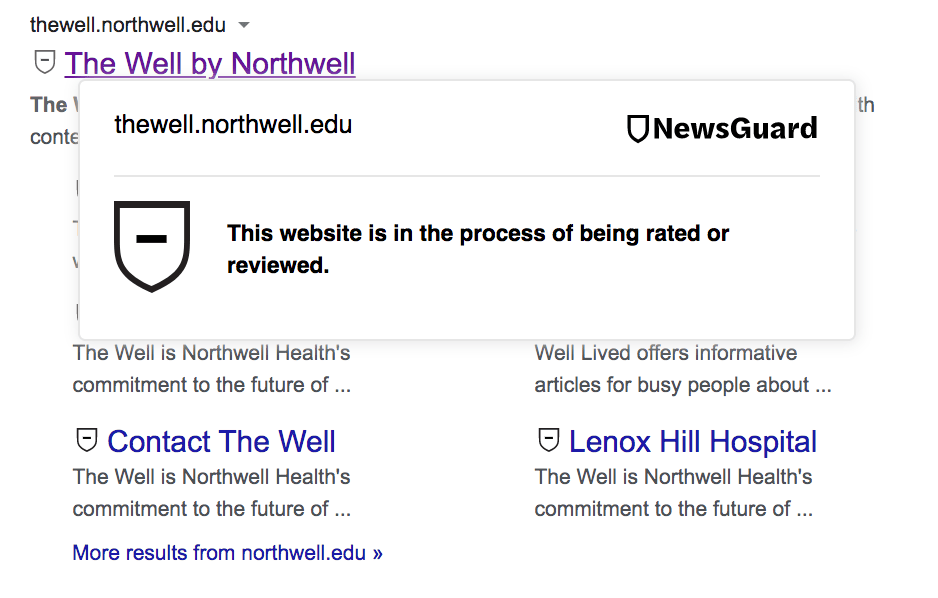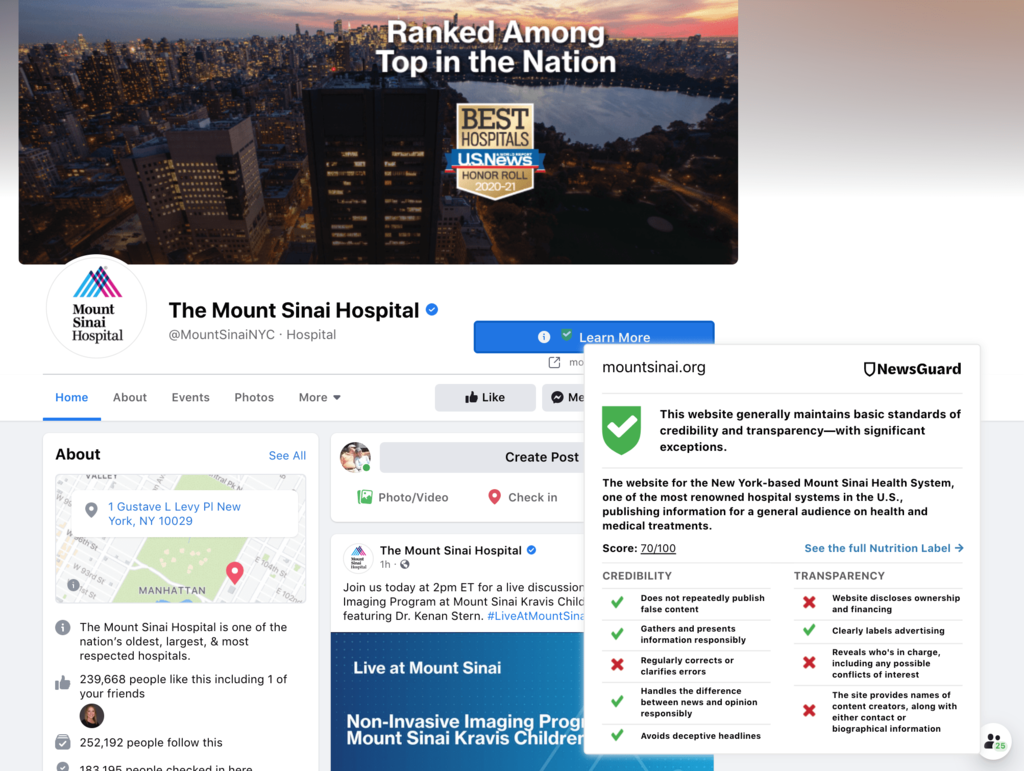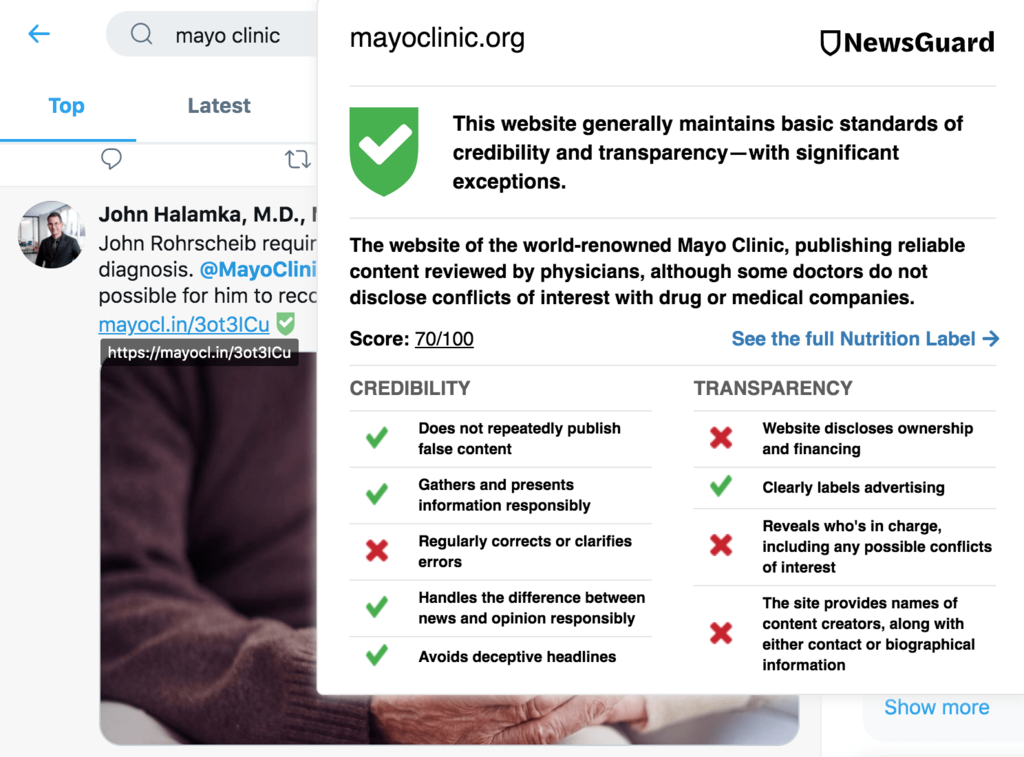Fighting the Infodemic: How a Browser Extension Separates Fact from Fiction
// By Jane Weber Brubaker //
 As marketers, we spend time and resources to take full advantage of the internet. We want our content to show up at the top of the search results page. We want our brand to be trusted. We want our physicians to be the ones patients find and choose.
As marketers, we spend time and resources to take full advantage of the internet. We want our content to show up at the top of the search results page. We want our brand to be trusted. We want our physicians to be the ones patients find and choose.
But as we’ve seen over the past 12 months, there are many competing voices. It’s becoming more and more difficult to tell fact from fiction. Even normally trusted sources of information have come under suspicion as competing forces seek to spin the facts to serve their interests. And as we all self-select our news sources, the “truth” becomes highly subjective. The divisions caused by competing realities were starkly apparent on January 6 in Washington, D.C.

Sarah Brandt, executive vice president of partnerships, NewsGuard
A new company founded in 2018, NewsGuard, and its sibling product, HealthGuard, are giving internet users transparency tools to discern the reliability of online information.
In late August, the company announced a partnership with the World Health Organization (WHO). Dr. Sylvie Briand, director of WHO’s Infectious Hazards Management Department, stated in the press release: “It is vital that people everywhere get the right information at the right time to protect themselves and their loves ones. That’s why we are looking forward to working with NewsGuard and other platforms to fight misinformation and disinformation.”
SHCM spoke with Sarah Brandt, executive vice president of partnerships at NewsGuard, for this article. “HealthGuard includes more than 2,000 websites covering health topics,” she says. Each site is evaluated and scored by humans — experts in journalistic standards — based on nine criteria. “Instead of evaluating the veracity of an individual article or claim, we provide an assessment of the general reliability of new sources,” says Brandt.
As hospitals and health systems publish and distribute health care content to drive consumers to their websites, scoring high as a trustworthy source of accurate information could make the difference between a consumer choosing your physician or someone else’s.
How the Health Care Industry Addresses Disinformation & Misinformation
By the end of January 2020, as the coronavirus was beginning to spread, WHO declared it a “public health emergency of international concern”; on March 11 it was officially declared a pandemic.
In mid-March, leaders from the global health care community formed a collaborative — the COVID-19 Healthcare Coalition — to share information and tackle the coronavirus from all angles. The coalition’s 16 working groups cover everything from supply chain and convalescent plasma to telehealth and contact tracing.
One group focuses on disinformation and misinformation. In May the group published a paper, “Health Communication Science: The Amplification of Health Dis/Mis Information for COVID-19.” It addresses current interventions and new opportunities to address the problem.
The paper states that as early as February 2020, WHO convened leaders from technology companies and social media platforms — Apple, Facebook, YouTube, Amazon, Twitter, Dropbox, Salesforce, and others — to discuss ways to work together to stem the proliferation of false information.
WHO’s partnership with NewsGuard further expands the collaboration. The August announcement said: “NewsGuard has agreed to provide data and information related to healthcare-related disinformation and misinformation that is appearing on each of the digital platforms [WHO advises], including major social media and search providers. The data and information will be available as an electronic feed to the relevant social media and search platforms that the WHO designates to receive it.”
What Is NewsGuard?
Self-described as “The Internet Trust Tool,” NewsGuard was founded in 2018 by veteran media entrepreneurs and journalists Steven Brill (founder of Court TV) and Gordon Crovitz, former publisher of the Wall Street Journal.
“We look at the websites that account for 95 percent of all engagement with news,” says NewsGuard’s Brandt. “We’ve rated more than 6,000 websites at this point.”
Websites are evaluated based on nine criteria, which read a little like the 10 commandments, with five criteria for credibility and four for transparency:
Credibility
- Does not repeatedly publish false content
- Gathers and presents information responsibly
- Regularly corrects or clarifies errors
- Handles the difference between news and opinion responsibly
- Avoids deceptive headlines
Transparency
- Discloses ownership and financing
- Clearly labels advertising
- Reveals who’s in charge, including possible conflicts of interest
- Provides names of content creators, along with either contact or biographical information
How It Works
To access the ratings, consumers subscribe to a browser extension for $2.95 a month. HealthGuard, the health care-specific product, also has a partnership program with health systems that want to offer the tool to employees and patients who opt in. “I think at its best, it can help physicians by reducing the amount of time they have to spend with their patients debunking misinformation,” Brandt says.
Currently, the extension is available on four browsers: Chrome, Firefox, Safari, and Microsoft Edge.
Once the extension has been activated, sites that have been evaluated show a small shield — green if the site adheres to journalistic standards, red if it does not, no color if the site is currently being evaluated, yellow if the site is satire, and gray if the site has user-generated content that the site owner does not vet, such as Wikipedia.
Searching for “Health systems in New York,” for example, a site that comes up high on the search results page is Mount Sinai Health System.

To see more detail, a searcher mouses over the green shield and can see that Mount Sinai scores 70 out of 100, with several areas for improvement.

Clicking on the full “Nutrition Label” provides extensive information, including ownership and financing, content, credibility, and history. The author is named as well as sources.
Northwell Health’s blog, The Well, is an example of a site being reviewed by NewsGuard.

The NewsGuard icons also appear on social media platforms. On Mount Sinai’s Facebook page, the green shield appears in the blue “Learn More” button.
On this Mayo Clinic Twitter post, the green shield appears next to the link to the content. Mousing over the shield shows Mayo Clinic’s score of 70/100.
As we see evidence all around us of the destructive impact of dis/mis information, the need for a reality checker has never been more critical. We applaud the Coalition, WHO, NewsGuard, and all who are working to address these issues.
Website owners (or anyone) can request a rating for a site by completing a form or emailing tips@newsguardtech.com. NewsGuard also publishes health care reports and tracking information. Here are some examples:
- The Coronavirus Misinformation Tracking Center lists websites that publish false information.
- Special Report: Top COVID-19 Vaccine Myths includes the myths as well as the facts to debunk them.
Jane Weber Brubaker is executive editor of Plain-English Health Care, a division of Plain-English Media. She directs editorial content for eHealthcare Strategy & Trends and Strategic Health Care Marketing, and is past chair of the eHealthcare Leadership Awards. Email her at jane@plainenglishmedia.com.


